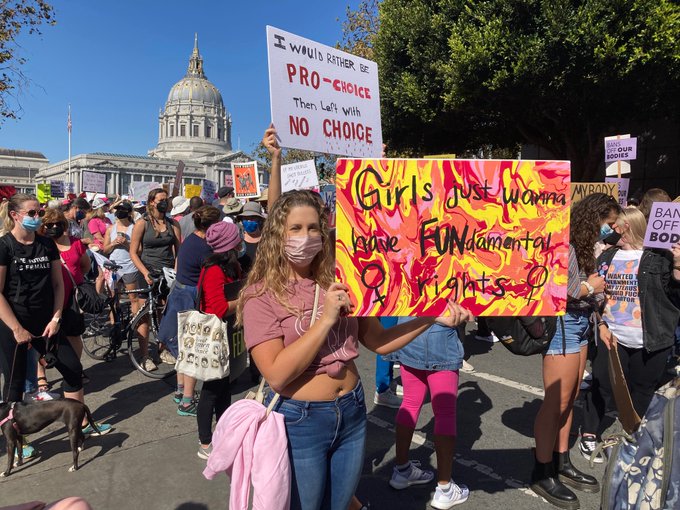That makes Women's March one arm of a much bigger strategy for abortion-rights advocates as they figure out how to react to Texas's SB 8, a law that bans abortions after about six weeks of pregnancy.
"We really thought we were going to get relief from the Supreme Court with this being so blatantly unconstitutional," said Marva Sadler, director of clinical services at Whole Woman's Health in McAllen, Texas. "But what we do next, and exactly what happens next? I don't know that any of us know that yet."
The day before the march, the Biden administration urged a federal judge to block the nation’s most restrictive abortion law, which has banned most abortions in Texas since early September. It's one of a series of cases that will give the nation's divided high court occasion to uphold or overrule Roe v. Wade.
The Texas law motivated many of the demonstrators and speakers.
“We’re going to keep giving it to Texas,” Marsha Jones of the Afiya Center for Black women’s reproductive justice in Dallas pledged to a crowd of marchers in Washington. “You can no longer tell us what to do with our bodies!”
Abortion-rights advocates in Texas have mobilized to inform patients of their options, as well as to provide funds to help people pay for the procedures. There are legal challenges to the law, and the city of Austin has agreed to "investigate and pursue appropriate legal action in support of current efforts to challenge" SB 8. In the medium and long term, the law may also energize Democrats in upcoming elections, including the 2022 midterms.
But all that work can make stepping back and thinking about the bigger political picture tough. To Aimee Arrambide, executive director of the Texas abortion-rights organization Avow, the Texas law makes it clear that some on the left got complacent and even shy about fighting for abortion rights.
"I think that we've allowed abortion stigma to permeate all of progressive actions. People call it 'women's health care,' 'reproductive health care.' People won't use the word 'abortion,'" she said. "Abortion tends to be the rights that get negotiated away when progressives are fighting for issue areas."
In California, a coalition of reproductive rights and justice organizations known as the California Future of Abortion Council says it's currently analyzing ways to expand access to abortion care to residents and others who may need it.
In New York, Gov. Kathy Hochul spoke at rallies in Seneca Falls and then Albany. “I'm sick and tired of having to fight over abortion rights," she said. "It's settled law in the nation and you are not taking that right away from us, not now, not ever.”
At an unrelated event in Maine, Republican Sen. Susan Collins called the Texas law “extreme, inhumane and unconstitutional” and said she’s working to make Roe v. Wade the “law of the land.”
She said she’s working with two Democrats and another Republican, and they’re “vetting" the language of their bill. Collins declined to identify her colleagues, but said the legislation will be introduced soon.
An opponent of abortion rights called this year's march theme “macabre.”
“What about equal rights for unborn women?” tweeted Jeanne Mancini, president of an anti-abortion group called March for Life.
